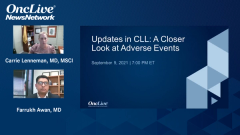
Baseline Testing Prior to Initiation of BTKi Treatment in CLL
Drs Lenneman and Awan discuss baseline testing before choosing a treatment strategy for battling chronic lymphocytic leukemia.
Episodes in this series

Farrukh Awan, MD: One of the issues we talk about all the time is whether there’s a baseline testing everyone should get. For example, you’ve obviously dealt with a lot of patients who have anthracycline use toxicity, and we’re familiar with those on the chemotherapy side. We’ve been using it for decades—doxorubicin, daunorubicin—so we know exactly what to do, and you know how to manage it. Is there a set process for consideration of a work-up for a patient you’re planning on starting on a BTK inhibitor? I can tell you what I do, but I’m not sure what you would recommend. I do an EKG [electrocardiogram] as a baseline for all my patients. I’m not sure about the echocardiogram. I definitely do it if there’s any history of cardiac issues. I also refer the high-risk patients to cardio-oncology specifically, even if they have another cardiologist managing them. I get another opinion from the cardio-oncology colleagues, so we cover all our bases. That’s what I do. Do you have specific recommendations if somebody is seeing a patient, let’s say who’s 75 years old? What do you look at? Is there a list of things that maybe we should pay attention to so that we can optimize their cardiac health?
Carrie Lenneman, MD, MSCI: You’re exactly right. From an oncologist standpoint, definitely get a base study ECG. I tend to see patients who are a little high risk, with 2 or more significant cardiac risk factors: a history of some coronary disease, hypertension, obesity, diabetes, and chronic kidney disease. They might still get referred to me. Obviously, once they’re referred to me, I almost always get a baseline echocardiogram. There’s some risk of heart failure in these individuals, especially because of a small concern of VT [ventricular tachycardia]. VT tends to occur in patients who don’t have a structurally normal heart, so I like to screen with an echocardiogram. Do I think we’ll ever move to a consensus saying that everyone is starting on a BTK inhibitor needs an echocardiogram? Probably not. But if they have several cardiac risk factors, it might not be a bad idea. If you know someone has no significant heart failure, …they’re less likely to have VT. That’s what needs to be teased out better in these trials. You’re right. There’s a very low incidence of VT, but who are the patients getting VT? How can we better characterize those individuals? A baseline echocardiogram might help us understand that better.
Other things that are really important: obviously having a good sense of a person’s blood pressure. If they’re hypertensive in clinic, you don’t want that. I do think controlling their blood pressure and keeping it under 130/80 is very important. Also, doing more of just a good medical background, maybe getting a hemoglobin A1C [glycated hemoglobin] and a lipid profile, just because those 2 things help us risk stratify a patient. If you realize a patient isnewly diabetic or has a very high lipid profile, you know they’re going to be an increased risk. Those are the things I do. I get an ECG, an A1C, a lipid profile. I’m seeing a skewed view because they’ve already been past an oncologist who said, “Wait a minute, you’ve got too many risk factors and you’re going to us.” Those are things I would think about. I really like considering doing a 30-day event monitor during the first several months of the treatment because I found a lot of people who’ve developed occult AFib [atrial fibrillation], and we’ve been able to deal with it up front.
Farrukh Awan, MD: I completely agree. I thought that’s what you were also suggesting. The cardio-oncologist needs to be involved up front—definitely in the high-risk patients, and possibly as an e-consult for all patients.
Carrie Lenneman, MD, MSCI: That’s how we’ve devised our strategy. You’ve got 2 or more cardiac risk factors, and you’re going to start a BTK inhibitor. The hopes is that you’re going to be on a BTK inhibitor for a good long period of time and you’re going to respond to it. How can we manage a person’s underlying cardiovascular history and mitigate that up front?
This transcript has been edited for clarity.



































